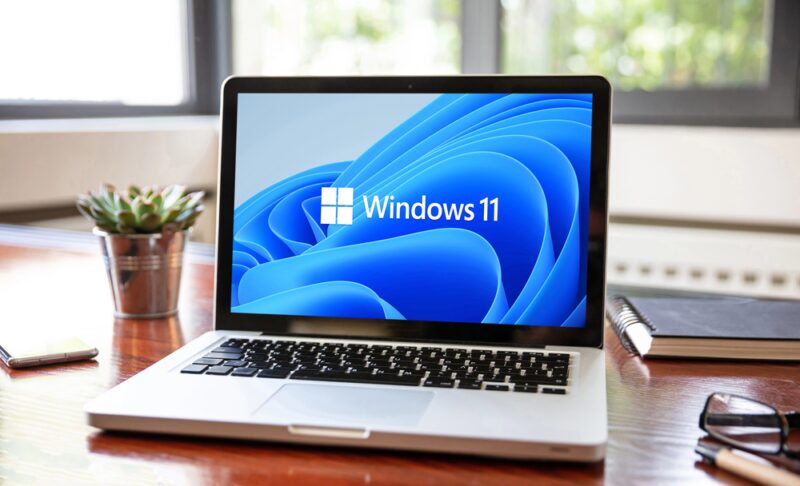Why the Upgrade to Windows 11 Matters Right Now
As the digital workplace evolves, the tools we use must keep pace. One of the biggest changes facing organizations today is the shift from Windows 10 to Windows 11. More than just a cosmetic Windows update, this transition marks a significant leap forward in user experience, security, and performance — and it’s one that businesses can’t afford to overlook.

End of Windows 10 Support Is on the Horizon
Microsoft has officially announced that support for Windows 10 will end in October 2025. After this date, users will no longer receive essential security updates, technical support, or bug fixes. This doesn’t just mean an outdated interface — it introduces real risks, including exposure to malware, compliance issues, and increasing maintenance costs.
For enterprises relying on Windows 10, the clock is ticking. Now is the time to start planning a structured and efficient migration to Windows 11.
New Features, New Standards
Windows 11 brings a redesigned, productivity-focused experience. Microsoft has reimagined how professionals interact with their systems, from Snap Layouts for multitasking to DirectStorage for faster load times. For IT teams, that means streamlined deployment, better group policy management, and enhanced support for modern hardware.
Notable features include:
- A centered Start Menu and updated taskbar
- Enhanced support for virtual desktops and multi-monitor setups
- Integrated Microsoft Teams for seamless collaboration
Windows 11 isn’t just about aesthetics — it’s designed to meet the demands of the hybrid workforce.
Evolving Business Needs and Remote Work Realities
The shift toward hybrid and remote work environments has made flexibility and security more important. Windows 11 addresses this with deeper integration of cloud services, Zero Trust security architecture, and improved tools for managing devices across dispersed teams.
Whether you’re working from the office, home, or anywhere in between, Windows 11 helps your teams stay connected, productive, and protected.
Key Benefits of Windows 10 to 11 Upgrade
Migrating to a new operating system can seem daunting, but the advantages of upgrading to Windows 11 make a strong business case. Microsoft has packed the OS with enterprise-grade features that improve productivity, bolster security, and enhance user satisfaction.
1. Security Enhancements
Cybersecurity is a growing concern for every organization, and Windows 11 takes a significant leap forward in this area. It’s built with security at the core, requiring modern hardware to enable advanced protections like:
- TPM 2.0 (Trusted Platform Module): Provides hardware-level encryption to safeguard credentials and encryption keys.
- Secure Boot: Prevents malicious software from loading during system startup.
- Virtualization-based Security (VBS) and Hypervisor-Protected Code Integrity (HVCI): Block sophisticated attacks and isolate key processes.
These features aren’t just beneficial — they’re quickly becoming essential for businesses focused on protecting sensitive data and ensuring compliance with evolving security standards.
2. Performance and Efficiency
Windows 11 has been optimized for performance, especially when paired with newer processors and SSD storage. It offers:
- Faster resume from sleep
- Improved battery efficiency for laptops
- Smoother multitasking and app performance
For IT administrators, the streamlined update process in Windows 11 reduces system downtime, allowing patches and upgrades to roll out more predictably and with less disruption to users.
3. A More Streamlined User Experience
Microsoft has focused heavily on usability and interface design in Windows 11. The result is a cleaner, more modern layout that prioritizes productivity. With features like:
- Snap Layouts and Snap Groups for intelligent window management
- A redesigned Start Menu with personalized content
- Enhanced support for touch, pen, and voice input
Users can work more intuitively across different device types and screen sizes.
For teams, this translates to less time adapting and more time executing. For businesses, it’s a win in both performance and user adoption.
What’s Changing from Windows 10 to Windows 11?
The transition from Windows 10 to Windows 11 brings more than visual polish. Under the hood, Microsoft has introduced new system requirements, security standards, and deployment considerations — all of which IT teams need to understand before initiating an upgrade.
System Requirements You Can’t Ignore
Windows 11 introduces stricter hardware requirements than its predecessor. This partly supports the advanced security and performance features built into the OS. At a minimum, eligible devices must meet the following hardware requirements:
- A compatible 64-bit processor (1GHz or faster, 2+ cores)
- 4GB of RAM and 64GB of storage
- UEFI firmware with Secure Boot capability
- TPM 2.0 chip
- A DirectX 12-compatible graphics card
These requirements may render many older systems ineligible for the upgrade. Microsoft’s PC Health Check tool is an easy way to assess compatibility, but a full inventory audit is essential for enterprise environments.
Application Compatibility and Legacy Systems
For many organizations, upgrading isn’t just about the OS — it’s about ensuring that all applications and workflows remain uninterrupted. Microsoft maintains that apps running on Windows 10 should generally function on Windows 11, thanks to strong backward compatibility.
That said, legacy apps, bespoke software, and industry-specific tools can behave unpredictably on a new OS. EIRE Systems offers compatibility testing and remediation strategies to help you identify and resolve potential issues before they impact business operations.
Licensing and Cost Considerations
For eligible devices, the Windows 11 upgrade is free, but there are still licensing and budgeting implications for businesses:
- Do you use volume licensing or Microsoft 365 plans with device management?
- Will new hardware be required for some endpoints?
- How will upgrades affect support contracts and SLAs?
Understanding these factors upfront ensures a cost-effective, compliant rollout with no surprises.
Planning Your Windows 11 Upgrade Strategy
A successful Windows 11 upgrade starts with a strategic approach. Rather than treating the move as a simple OS update, businesses should view it as an opportunity to enhance their overall IT environment, improving performance, security, and scalability.
Inventory and Assessment
Start by taking stock of your current infrastructure. Which devices meet Windows 11’s system requirements? Which ones don’t? This assessment phase helps:
- Identify systems that are ready for upgrade
- Flag outdated hardware for replacement
- Highlight potential software compatibility concerns
Tools like Microsoft Endpoint Manager or third-party IT asset management solutions can simplify this process across enterprise networks.
Testing and Pilot Deployments
Once your inventory is complete, the next step is controlled testing. Rolling out Windows 11 to a small group of users — ideally from different departments — allows you to monitor:
- Application performance
- User Feedback
- Security configurations
- Any unexpected technical issues
This phased approach helps uncover problems early and refine the rollout plan for the broader organization.
Training and Change Management
Even with all the technical preparation, user adoption is critical. Windows 11 introduces UI and workflow changes that can affect daily operations, so it’s essential to invest in the following:
- User training sessions on new features and layout
- Internal support documentation tailored to your team
- Clear communication around timelines and expectations
When employees feel informed and supported, adoption becomes smoother and more successful.
How EIRE Systems Supports Your Windows 11 Transition
EIRE Systems has helped organizations across Asia-Pacific navigate complex IT transformations, and the Windows 11 upgrade is no exception. With decades of experience in IT strategy, deployment, security, and support, we bring a full-service approach to managing your migration.
Enterprise-Ready Upgrade Planning
We work closely with clients to develop tailored Windows 11 upgrade roadmaps aligned with business objectives and IT policies. Whether you’re a small team or a multinational enterprise, we ensure:
- Minimal disruption to your operations
- Compliance with internal and external standards
- Transparent timelines and cost forecasting
From single-site upgrades to regional deployments, we’ve got you covered.
Compatibility Audits and Risk Mitigation
Worried about your legacy applications? Unsure if your infrastructure meets Windows 11 requirements?
EIRE Systems provides comprehensive IT environment audits, helping you:
- Evaluate hardware and software compatibility
- Identify high-risk systems or applications
- Mitigate upgrade issues before they arise
End-to-End Deployment Support
From project kickoff to full rollout, our team handles every step:
- Image creation and device configuration
- User data migration and backup
- Automated deployments and endpoint management
- Post-migration troubleshooting and support
Our engineers are on the ground — and online — to make sure your migration is smooth, secure, and aligned with your IT roadmap.
Training, Support & Futureproofing
Windows 11 is just the beginning. As Microsoft continues to evolve its ecosystem, EIRE Systems ensures you’re ready for what’s next:
- Ongoing support and system monitoring
- User training for future updates and features
- Scalable IT frameworks to support growth
We don’t just deliver upgrades — we deliver resilience.
Don’t Wait—Start Your Windows 11 Upgrade Journey with Confidence
Time is ticking. With Windows 10 support ending in 2025, the window for a stress-free transition is narrowing. But with the right planning and the right partner, upgrading doesn’t have to be a challenge — it can be a competitive advantage.
Ready to make the move from Windows 10 to Windows 11? EIRE Systems is here to simplify the process, minimize risks, and ensure your upgrade is smooth, secure, and optimized for the future.
Contact us today to build your customized Windows 11 upgrade plan — and take the next step toward a more secure, efficient, and agile IT environment.
About the Author: EIRE Systems
EIRE Systems is a leading independent provider of professional IT, AV and Access Security services to the financial, insurance, manufacturing, health care, retail, construction, hospitality, commercial real estate, legal, educational and multinational sectors in Japan and throughout the Asia Pacific region. EIRE Systems has expertise across a wide spectrum of Information Technologies, with a track record for successfully completing hundreds of assignments since its establishment in 1996.



